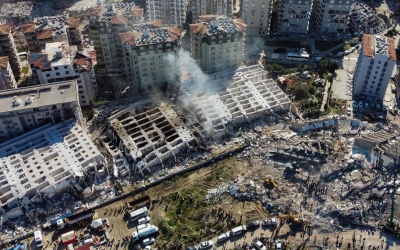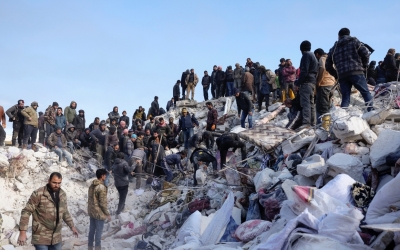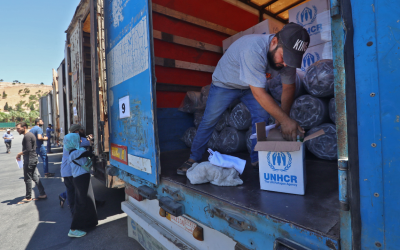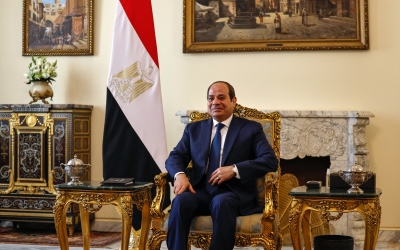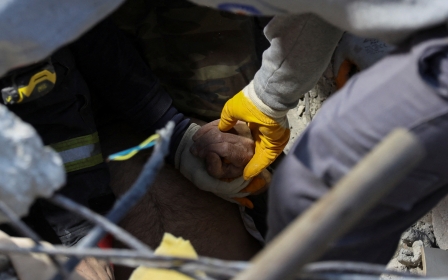Syria earthquake: Are sanctions obstructing the delivery of aid to Syria?
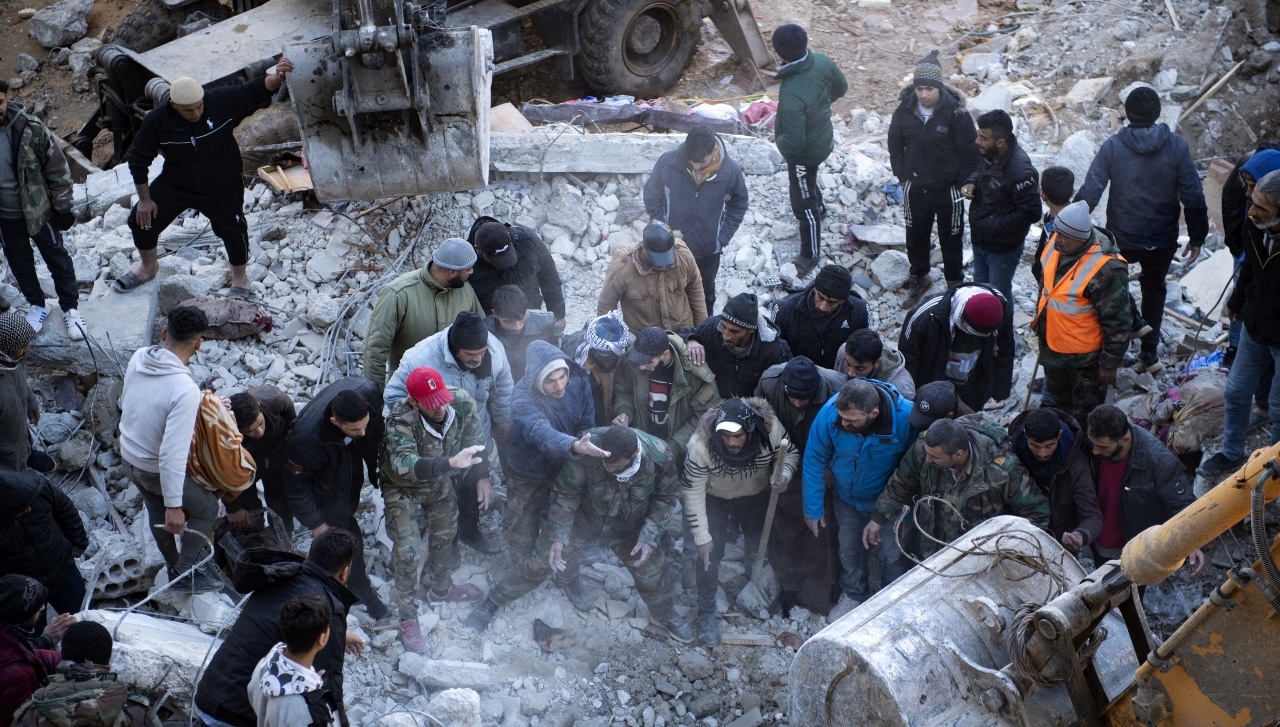
As the death count from a series of deadly earthquakes that struck Syria and Turkey continues to rise, a debate is emerging over whether western sanctions on Syria are hampering aid to the war-torn country.
Syria has been wracked by conflict since the 2011 Arab spring protests, when the government of Bashar al-Assad responded with violence against a popular uprising against his rule.
Assad managed to turn the tide of the war thanks to Russian and Iranian backing, but Syria's economy has been decimated in the process. The country is struggling with crippling fuel shortages and stringent sanctions - around 90 percent of the population lives below the poverty line.
The bulk of the country is under the control of Damascus, US-backed Kurdish forces hold the northeast, and the northwest - home to about four million internally displaced persons and the hardest hit by the earthquakes - is controlled by rebel groups, including Hayat Tahrir al-Sham, designated a terrorist organisation by the US, UN and EU.
“It's important to remember there are two sets of sanctions involved here, both on the Assad regime and Tahrir al-sham (HTS),” Aron Lund, a fellow at Century International, told Middle East Eye.
“Both sets of sanctions cause some form of trouble for humanitarian situations, and they always have,” he added.
Because of the devastation of the quakes, some aid organisations, including the Damascus-based Syrian Arab Red Crescent, have called for sanctions to be lifted on the Assad government.
Damascus has also upped its rhetoric, calling for sanctions to be removed. On Tuesday, Syrian Foreign Minister Faisal Mekdad said that sanctions on Syria have “made the disaster all the worse”.
But many analysts say the situation is far more complex.
Politics of aid
“There is no relationship between the West’s punitive sanctions on the Assad regime and the delivery of humanitarian aid - none whatsoever,” Charles Lister, director of the Syrian programme at the Middle East Institute, told MEE.
“The fact that this has become a subject of discussion is precisely what the regime wants - to expand the conversation to include its normalisation,” he added.
Aid into northwest Syria has indeed moved at a trickle compared to assistance into southeast Turkey, a region that was also the traditional staging ground for humanitarian groups working in rebel-held Syria. The rebel Syrian National Army in the northwest of the country is backed by Turkey.
The only border crossing used by the UN to transport assistance into Syria was damaged by the disaster and just reopened on Thursday.
Ironically, international aid has actually been moving into Syria, but into government-controlled territory. Damascus has received aid from Russia, the UAE, Iran, Algeria, and Iraq.
According to Lister, it is “imminently set” to receive additional aid from the UN, European Union, Saudi Arabia, and Egypt, among others.
The UN operates in government-controlled parts of Syria, and according to Lister, receives 91 percent of its funds from sanctioning entities, like the US and EU.
Blame game
A report released in October found "systemic" corruption in UN humanitarian aid to Syria, with individuals accused of human rights abuses benefiting from procurement contracts with the international body.
Between 2019 and 2020, nearly 47 percent of UN procurement funding in Syria went to businesses tied to human rights abuses committed by the Assad government, according to a report by the Syrian Legal Development Programme (SLDP) and the Observatory of Political and Economic Networks (Open).
The authors found that Damascus kept 51 cents of every international aid dollar spent in Syria in 2020.
"[Western countries] don’t want to give Damascus bilateral aid, not because of sanctions but because they rightfully don't trust Damascus to not massively exploit and deprive other areas,” Dareen Khalifa, a senior analyst at the International Crisis Group, told MEE.
Humanitarian aid to Syria is technically exempt from sanctions. However, Lund, from Century International, said that in practice, a lack of clarity on what is permissible can delay the aid process.
“Good luck trying to find a bank that will let you wire money to Syria,” he said.
At the same time, Syria’s internal dynamics complicate the situation, Lund added.
The country's long history of corruption has been turbocharged by the war, so that most major businesses are in some way controlled by government insiders, who are themselves under sanctions.
“Even though there are very clear humanitarian exemptions, in practice a lot of humanitarian work relies on the surrounding economy and private companies to deliver goods and services,” Lund said.
But Khalifa from ICG says “sanctions come late in the list” of what is delaying the quake aid response.
She says a lack of infrastructure as a result of Syrian and Russian carpet bombing, the financial crisis in neighbouring Lebanon, and widespread corruption in Damascus are probably greater hindrances than any specific western sanctions.
Reasserting authority
The Syrian government has also ruled out allowing aid to travel directly to rebel-controlled areas. Four cross-border aid points established by the UN in 2014 have gradually been closed by Damascus and its Russian backer, leaving Bab al-Hawa as the only remaining option.
US Secretary of State Antony Blinken on Thursday urged Assad to open all border crossings into Syria and UN Secretary General Antonio Guterres pushed for greater aid access into Syria, referring to the closed border crossings.
Damascus claims aid moving into the country outside of territory it controls is a violation of Syrian sovereignty. Bassam Sabbagh, Syria’s UN ambassador, said on Monday that all aid should be channelled via Damascus.
“What we should really be asking though, is why hasn’t any disaster relief reached the opposition-held northwest? Because the regime is impeding it,” Lister said.
The current crisis presents an opportunity for Assad to assert his authority in Syria and ramp up efforts aimed at regional normalisation.
President Assad is gradually being welcomed back into the regional fold. He visited the UAE last year and has spoken with Jordan’s King Abdullah II. He has also been courted by Turkish President Recep Tayyip Erdogan.
Following the quake, he received a call from Egyptian president Abdel Fattah el-Sisi, the first official exchange between the two leaders. On Thursday, Tunisia's president Kais Saeid said his country would strengthen diplomatic ties with Syria.
Middle East Eye delivers independent and unrivalled coverage and analysis of the Middle East, North Africa and beyond. To learn more about republishing this content and the associated fees, please fill out this form. More about MEE can be found here.


